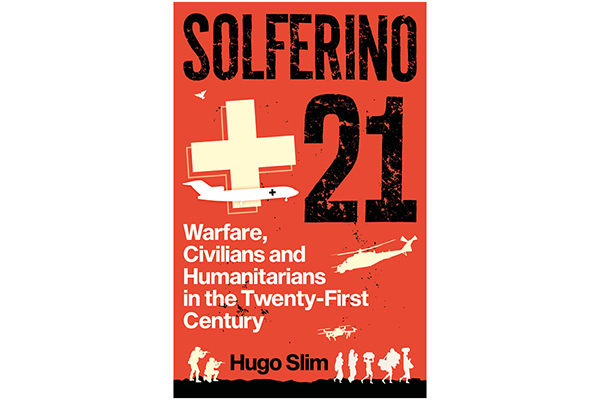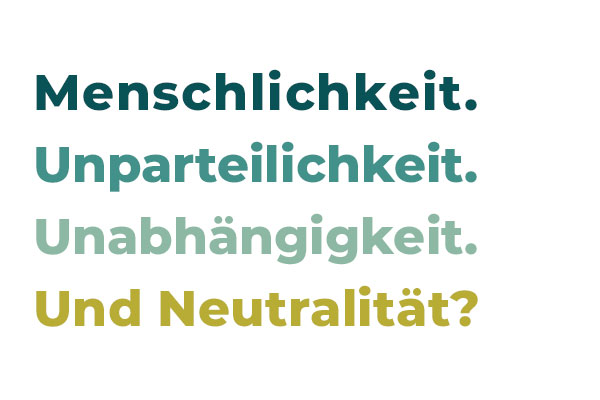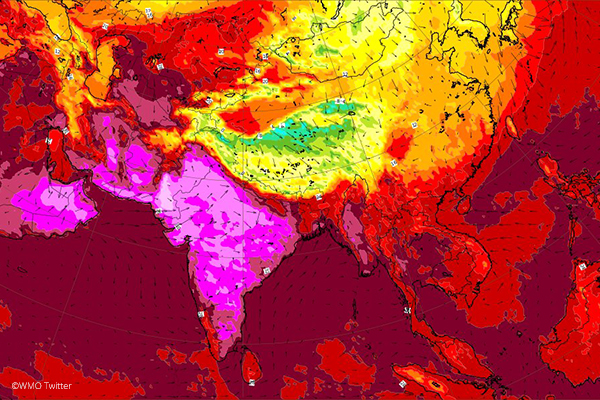| Datum: | 19.05.2022 |
| Uhrzeit: | 16:30 - 18:00 |
| Ort: | Refugio Berlin und per Zoom |
Buchpräsentation & Diskussion mit Hugo Slim,
Senior Research Fellow am Las Casas Institute for Social Justice, Oxford und Autor von “Solferino 21 – Warfare, Civilians and Humanitarians in the Twenty-First Century”
160 Jahre nach Henri Dunants Buch über die Schlacht von Solferino, das für den modernen Humanitarismus grundlegend wurde, hat Dr. Hugo Slim eine Reflexion über neue Kriegsführung, Cyberkriege und ihre Bedeutung für die dringend erforderliche Reform des humanitären Sektors geschrieben. Unmittelbar nach der Veröffentlichung des Buches „Solferino 21“ begann die Eskalation des Konfliktes in der Ukraine und löste eine Debatte über eine „Zeitenwende“ aus, die sogar über die in dieser aktuellen Publikation erörterten sicherheitspolitischen und humanitären Fragen hinausgeht.
Anlässlich der Buchvorstellung in Berlin luden das Deutsche Rote Kreuz und CHA zu einer Podiumsdiskussion über Hugo Slims Thesen und deren Auswirkungen auf die Humanitäre Hilfe im Lichte des Ukraine-Krieges mit:
- Dr. Hugo Slim, Autor von „Solferino 21 – Warfare, Civilians and Humanitarians in the Twenty-First Century“
- Dr. Ferdinand von Weyhe, Referatsleiter, Grundsatz Humanitäre Hilfe, internationaler Katastrophenschutz, humanitäres Minenräumen, Auswärtiges Amt
- Julia Meixner, Stellvertretende Leiterin, Programme & Zusammenarbeit Schwestergesellschaften, Deutsches Rotes Kreuz
- Irina Boicheva, Leiterin der Abteilung Zusammenarbeit und internationale Beziehungen der Repräsentanten des Nationalen Komitees der Ukrainischen Rotkreuzgesellschaft
moderiert von Ralf Südhoff, Direktor des Centre for Humanitarian Action; Begrüßung durch Christof Johnen, Leiter der internationalen Zusammenarbeit des Deutschen Roten Kreuzes.
Die Veranstaltung wurde aufgezeichnet:
Kapitelmarken:
00:00 Welcome by Ralf Südhoff
01:03 Introduction by Christof Johnen
04:46 Audience survey regarding statements from the book
09:30 New Warfare – Dr. Hugo Slim about the book
18:34 Towards simpler Humanitarian Aid?
24:06 How does the book relate to the War in Ukraine?
25:39 Humanitarian aid in Ukraine today – Irina Boicheva
38:08 Are great power conflicts coming back? – Dr. Ferdinand von Weyhe
46:45 Humanitarians in Protracted Crisis
48:18 National Societies and Localization– Julia Meixner
53:09 Does neutrality prevent true localization?
1:04:18 Input and comments from the online participants
1:07:55 Great power confrontations, localization with super agencies– Dr. Hugo Slim
1:13:00 How can local action not be dominated by superagencies? – Irina Boicheva
1:16:40 The German contribution to the humanitarian task – Dr. Ferdinand von Weyhe
1:21:10 Is the humanitarian system reformable? – Julia Meixner
1:22:36 Audience Questions and comments
1:32:36 Humanitarian growth, necessary reform and big data – Dr. Hugo Slim
1:37:44 How does digitalization help and/or hinder humanitarian aid in Ukraine – Irina Boicheva
1:41:43 Donor responsibility, political interests, solidarity – Dr. Ferdinand von Weyhe, Julia Meixner
1:47:00 Closing statements from the panel
Zitate:
Hugo Slim
12:30 “…now we’re at a tipping point from industrial warfare to computerized warfare”
13:18 “Our warfare today is very different … the center of the frame now, is the female civilian. Rather than the wounded male.”
17:11 “in fact, if you look at the middle of the 20th century, if you look at the Korean war and probably if you look at the bombing of Vietnam by the Americans and others in the Vietnamese American war you’ll see much greater direct violent deaths of civilians than we’ve seen in the 20 years so far.”
20:21 “I think increasingly, if we have big conflicts between authoritarian cultures and liberal cultures, there’ll be no room for that kind of liberal humanitarianism in authoritarian space. Therefore, it’s really important that we also build national networks of …a more basic, simpler humanitarianism…so that lives are saved…”
22:11 “Wherever you can, and in anything you do, you should be saying, how can I keep it simple. How can I seek simplicity in this approach”?
25:15 on localization and the Ukraine war “…don’t have a second, humanitarian invasion of hundreds of people and agencies coming in to tell Irina exactly what to do and when to do it”
56:14 “There has always also been a liberationist tradition, that people have also done humanitarian aid with political commitments. So, they’ve always said “I’m on the side of this conflict and my purpose in this conflict will be to save as many lives as I can but I have taken sides. And that to me is a perfectly legitimate, ethical commitment. And you can still be absolutely respecting the principle of humanity and not be neutral.”
Irina Boicheva
30:15 “Men are staying in Ukraine…maybe we’re not putting a lot of focus on men in the humanitarian sphere.…Usually it’s the elderly, it’s women, children but in a war context, men are also very affected.”
32:48 “Local organizations are in the middle of everything. They’re experiencing a lot of pressure from the public, from their own citizens, from the government, from the international community. And at the same time the local organizations are simply Ukrainians who are suffering and dealing with the same problems as any person now in my country.”
37:26 “It’s now really impossible to define the most vulnerable [people]. Every case is something difficult and very sad.”
1:14:25 on how to be a complementary international org. “It’s simply to find compromise not really to fill in the indicators and to create parallel structures. Try to be complimentary – to use the privilege of the competence of different actors.”
1:38:55 on digitalization in Ukraine during the war “It’s really a great benefit that the government is doing such great things. Because even to apply now for some cash support from governmental programs is only one click in the phone. People all over the country can apply and save time not staying in the violence in front of the state department.”
Dr. Ferdinand von Weyhe
45:30 “It is very important – and I do have the feeling that we sometimes underestimate that – to have a really conflict sensitive approach. To what extent does humanitarian assistance have an impact on the conflict situation, to which extent it plays into power games. I think from a pure humanitarian perspective we sometimes neglect that point.”
1:03:29 “I do see this necessity of neutrality for humanitarian assistance especially in times of war. If we start giving this up […] as parties to the conflict – Who will I trust to be neutral anymore? […] For humanitarian assistance neutrality is key.”
Julia Meixner
49:41 “Localization needs to be spiced up, right? If we want to avoid the superstructures, the complexity, we have to be serious about Localization so it’s not only about transferring X amount of money but what are we actually doing with that.”
“Really empowering local structures is a difficult task in particular when contexts are getting more complicated. In Ukraine now we have a rather clear solidarity with one party, but in not a lot of countries, this is the case.”
51:20 “ At one point we have to be honest about the limitations of the western system. The limitations of funds, the limitations of our capacities to actually move things. So, honesty is maybe one, unpacking, getting simpler and restarting to listen.”
“It’s very scary because you can do a lot of things wrong, so what we tend to do is to find a way to limit the risk for ourselves for our donors, to just phrase it somehow that is more comfortable for us. But it does not necessarily reflect the reality of the people we actually want to serve and support. I think we have to reverse this.”
1:45:45 “How big is our solidarity with the ones who will lose within globalization? And I think this is something where we are tested, and we will be tested even more.”
Dr. Hugo Slim ist ein britischer Akademiker und Politikberater im Fachbereich Internationale Beziehungen, der sich auf Kriegsethik und humanitäre Hilfe spezialisiert hat. Er schreibt über den Charakter moderner Konflikte, den Schutz der Zivilbevölkerung und die Ethik der humanitären Hilfe. Bisherige Bücher sind z.B. Humanitarian Ethics: The Morality of Aid in War and Disaster und Killing Civilians: Method, Madness and Morality in War. Derzeit ist er Senior Research Fellow am Las Casas Institute for Social Justice, Blackfriars Hall, Universität Oxford und an der Blavatnik School of Government.







